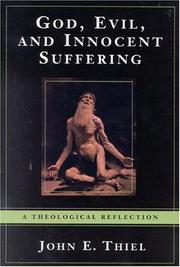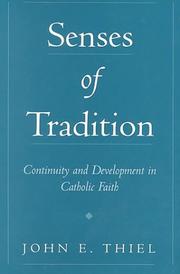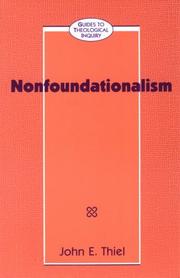| Listing 1 - 7 of 7 |
Sort by
|

ISBN: 0824519280 9780824519285 Year: 2002 Publisher: New York (N.Y.): Crossroad
Abstract | Keywords | Export | Availability | Bookmark
 Loading...
Loading...Choose an application
- Reference Manager
- EndNote
- RefWorks (Direct export to RefWorks)
Suffering --- Religious aspects --- Christianity. --- 231.512 --- -Affliction --- Masochism --- Pain --- Goed en kwaad. Lijden. God en het kwaad --- -Christianity --- -Goed en kwaad. Lijden. God en het kwaad --- 231.512 Goed en kwaad. Lijden. God en het kwaad --- -231.512 Goed en kwaad. Lijden. God en het kwaad --- Affliction --- Religious aspects&delete& --- Christianity --- Suffering - Religious aspects - Christianity.

ISBN: 1280834528 0195350316 9780195350319 9780195137262 0195137264 0195137264 0197741142 Year: 2000 Publisher: Oxford New York Oxford University Press
Abstract | Keywords | Export | Availability | Bookmark
 Loading...
Loading...Choose an application
- Reference Manager
- EndNote
- RefWorks (Direct export to RefWorks)
Since its origins, the Catholic Church has accepted both scripture and tradition as authorities for church teaching on God, Christ and salvation and has held that scripture is susceptible to interpretation.
Tradition (Theology) --- Authority --- Religious aspects --- Christianity --- Catholic Church --- Doctrines. --- 231.742.1 --- Openbaring en traditie --- 231.742.1 Openbaring en traditie --- Church of Rome --- Roman Catholic Church --- Katholische Kirche --- Katolyt︠s︡ʹka t︠s︡erkva --- Römisch-Katholische Kirche --- Römische Kirche --- Ecclesia Catholica --- Eglise catholique --- Eglise catholique-romaine --- Katolicheskai︠a︡ t︠s︡erkovʹ --- Chiesa cattolica --- Iglesia Católica --- Kościół Katolicki --- Katolicki Kościół --- Kościół Rzymskokatolicki --- Nihon Katorikku Kyōkai --- Katholikē Ekklēsia --- Gereja Katolik --- Kenesiyah ha-Ḳatolit --- Kanisa Katoliki --- כנסיה הקתולית --- כנסייה הקתולית --- 가톨릭교 --- 천주교
Book
ISBN: 9780268205232 026820523X 9780268205249 9780268205225 Year: 2023 Publisher: Notre Dame University of Notre Dame Press
Abstract | Keywords | Export | Availability | Bookmark
 Loading...
Loading...Choose an application
- Reference Manager
- EndNote
- RefWorks (Direct export to RefWorks)
Building on the insights of the ressourcement theology of grace, this sophisticated theological aesthetics offers a fresh vision of the doctrine of creation through a consideration of the beauty of time. Conventional eschatological accounts of life after death tend to emphasize the discontinuity between earthly life and the hereafter: whereas this life is subject to the contingencies of time, life after death is characterized by a stolid eternity. In contrast to this standard view, John E. Thiel's Now and Forever articulates a Catholic eschatology in which earthly life and heavenly life are seen as gracefully continuous. This account offers a reconceptualization of time, which, Thiel argues, is best understood as the sacramental medium of God's grace to creation. Thiel's project thus attempts to rescue time from its Platonically negative resonance in the doctrine of creation. Rather than viewing time as the ambiance of sinful dissolution, Thiel argues for a Christian vision of time's beauty, and so explicitly develops an aesthetics that views time as a creaturely reflection of God's own Trinitarian life. This thesis proceeds from the assumption that all time is eschatological time and is thus guided by attention to the temporality implicit in the virtue of hope, with its orientation toward a fulfilled future that culminates in resurrected life. This interpretation of the beauty of eschatological time in its widest expanse presses further the insight of ressourcement theology that grace is everywhere, while appreciating how time's graceful beauty manifests itself in the diversity of temporal moments, human communities, and most fully in the heavenly communion of the saints.
Time --- Religious aspects --- Christianity
Book
ISBN: 9780268042394 026804239X Year: 2013 Publisher: Notre Dame University of Notre Dame press
Abstract | Keywords | Export | Availability | Bookmark
 Loading...
Loading...Choose an application
- Reference Manager
- EndNote
- RefWorks (Direct export to RefWorks)

ISBN: 0800626923 Year: 1994 Publisher: Minneapolis (Minn.): Fortress
Abstract | Keywords | Export | Availability | Bookmark
 Loading...
Loading...Choose an application
- Reference Manager
- EndNote
- RefWorks (Direct export to RefWorks)
Book
ISBN: 0800625161 Year: 1991 Publisher: Minneapolis (Minn.): Fortress
Abstract | Keywords | Export | Availability | Bookmark
 Loading...
Loading...Choose an application
- Reference Manager
- EndNote
- RefWorks (Direct export to RefWorks)
Book
ISBN: 0268205248 0268205221 Year: 2023 Publisher: Notre Dame, Indiana : University of Notre Dame,
Abstract | Keywords | Export | Availability | Bookmark
 Loading...
Loading...Choose an application
- Reference Manager
- EndNote
- RefWorks (Direct export to RefWorks)
Building on the insights of the ressourcement theology of grace, this sophisticated theological aesthetics offers a fresh vision of the doctrine of creation through a consideration of the beauty of time. Conventional eschatological accounts of life after death tend to emphasize the discontinuity between earthly life and the hereafter: whereas this life is subject to the contingencies of time, life after death is characterized by a stolid eternity. In contrast to this standard view, John E. Thiel's Now and Forever articulates a Catholic eschatology in which earthly life and heavenly life are seen as gracefully continuous. This account offers a reconceptualization of time, which, Thiel argues, is best understood as the sacramental medium of God's grace to creation. Thiel's project thus attempts to rescue time from its Platonically negative resonance in the doctrine of creation. Rather than viewing time as the ambiance of sinful dissolution, Thiel argues for a Christian vision of time's beauty, and so explicitly develops an aesthetics that views time as a creaturely reflection of God's own Trinitarian life. This thesis proceeds from the assumption that all time is eschatological time and is thus guided by attention to the temporality implicit in the virtue of hope, with its orientation toward a fulfilled future that culminates in resurrected life. This interpretation of the beauty of eschatological time in its widest expanse presses further the insight of ressourcement theology that grace is everywhere, while appreciating how time's graceful beauty manifests itself in the diversity of temporal moments, human communities, and most fully in the heavenly communion of the saints.
Time --- Religious aspects --- Christianity.
| Listing 1 - 7 of 7 |
Sort by
|

 Search
Search Feedback
Feedback About UniCat
About UniCat  Help
Help News
News